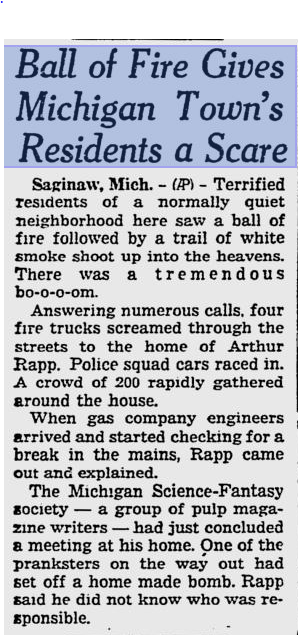Short Fiction Eligible for the 1941 Retro-Hugos Vol. 3, a collection of 30 public domain stories by Ray Cummings and Henry Kuttner, has been issued by File 770 commenter von Dimpleheimer. (Earlier posts contain links to Volume 1, and Volume Two.)
These books are created to help MidAmeriCon II members who will vote next year on the Retro Hugos (along with the regular Hugos).
The stories in Volume Three are:
- Ray Cummings “Arton’s Metal” in Super Science Stories, May 1940.
- Ray Cummings & Gabrielle Cummings (as Gabriel Wilson) “Corpses from Canvas” in Horror Stories, May 1940.
- Ray Cummings “The Girl from Infinite Smallness” in Planet Stories, Spring 1940.
- Ray Cummings “Ice over America” in Thrilling Wonder Stories, August 1940.
- Ray Cummings (as Ray King) “The Man Who Killed the World” in Planet Stories, Spring 1940.
- Ray Cummings “Perfume of Dark Desire” by in Horror Stories, May 1940.
- Ray Cummings “Personality Plus” in Astonishing Stories, October 1940.
- Ray Cummings “Phantom of the Seven Stars” in Planet Stories, Winter 1940.
- Ray Cummings “Priestess of the Moon” in Amazing Stories, December 1940.
- Ray Cummings “Revolt in the Ice” Empire in Planet Stories, Fall 1940.
- Ray Cummings “Space-Liner X87” in Planet Stories, Summer 1940.
- Ray Cummings “The Thought-Woman” in Super Science Stories, July 1940.
- Ray Cummings “The Vanishing Men” in Thrilling Wonder Stories, September 1940.
- Ray Cummings “When the Werewolf Howls” in Horror Stories, May 1940.
- Ray Cummings “World Upside Down in Thrilling Wonder Stories, December 1940.
- Henry Kuttner (as Peter Horn) “50 Miles Down” in Fantastic Adventures, May 1940.
- Henry Kuttner (as Kelvin Kent) “Beauty and the Beast” by Thrilling Wonder Stories, April 1940.
- Henry Kuttner “A Comedy of Eras” in Thrilling Wonder Stories, September 1940.
- Henry Kuttner “Dr. Cyclops” in Thrilling Wonder Stories, June 1940.
- Henry Kuttner “The Elixir of Invisibility” in Fantastic Adventures, October 1940.
- Henry Kuttner (as Paul Edmonds) “Improbability” in Astonishing Stories, June 1940.
- Henry Kuttner (as Paul Edmonds) “The Lifestone” in Astonishing Stories, February 1940.
- Henry Kuttner (as by Kelvin Kent) “Man About Time” in Thrilling Wonder Stories, October 1940.
- Henry Kuttner “No Man’s World” in Thrilling Wonder Stories, August 1940.
- Henry Kuttner “Pegasus” in Famous Fantastic Mysteries, May-June 1940.
- Henry Kuttner “Reverse Atom” in Thrilling Wonder Stories, November 1940.
- Henry Kuttner “The Shining Man” (as Noel Gardner) in Fantastic Adventures, May 1940.
- Henry Kuttner “Threshold” in Unknown, December 1940.
- Henry Kuttner “The Uncanny Power of Edwin Cobalt” (as Noel Gardner) in Fantastic Adventures, October 1940.
- Henry Kuttner “World without Air” in Fantastic Adventures, August 1940.
Click on the appropriate link to download a version from a Google storage drive.
Von Dimpleheimer has a fourth volume in process, however, his introduction to Volume 3 explains why you won’t be seeing some of 1940’s other most prolific authors in it – their work isn’t in the public domain.
According to ISFDB, Ray Cummings published 30 new stories in 1940 and Henry Kuttner published 23 stories and a novel. I believe this makes them the most prolific and fifth most prolific SF writers of that year, though they both sometimes (often?) wrote with their wives. Eando Binder (the brothers Otto and Earl Binder) are another team in the top five for 1940. In addition to being very productive, the brothers also had either a good record-keeping system, or Otto had a very good memory, for he was one of the handful of authors who renewed the copyrights for almost all of their 1940 stories in 1968. Therefore, none of their stories will be included in these volumes.
Of the top five, the only to write all of their stories alone (as far as is known) are John Russell Fearn and Nelson S. Bond. Fearn was British, so retroactively received life+70 years copyright for all his works, which will not become public domain until 2030. None of his stories will be included here either.

